Connect Salesforce® Marketing Cloud to Email Notification with LeadsBridge


In this article, you'll learn how to set up the bridge and connect Salesforce® Marketing Cloud to My CRM Example using LeadsBridge.
How to set up your bridge step-by-step tutorial
Before you start
- Head over to the left sidebar and click on the Create new Bridge green button
- You'll be taken to the first step of the bridge creation
Step 1: Choose the apps you want to connect
- Choose Salesforce® Marketing Cloud as the source for your bridge
- Choose Email Notification as the destination for your bridge
- Click on the Continue button
- At this point you can choose a name for your bridge (this will only be visible inside LeadsBridge and you can also edit it later)
Step 2: Configure your Salesforce® Marketing Cloud with Email Notification
Step 2.A: Setup your Salesforce® Marketing Cloud integration
- Click on Connect Salesforce® Marketing Cloud
- Click on Create new integration to connect your Salesforce® Marketing Cloud (or select an existing one from the dropdown if you already connected it)
- A popup wil be opened where you can authorize the Salesforce® Marketing Cloud integration
- Fill Client ID, Client Secret, Authentication Base URI field to connect Salesforce® Marketing Cloud with LeadsBridge
- Click on the Authorize button
- You can choose a name for this Salesforce® Marketing Cloud and LeadsBridge integration (you can also edit it later)
- Once done, click on Continue button and you will get back to the bridge experience where you could choose additional integration settings
- Now that your Salesforce® Marketing Cloud is connected, you can continue with the set-up of your bridge
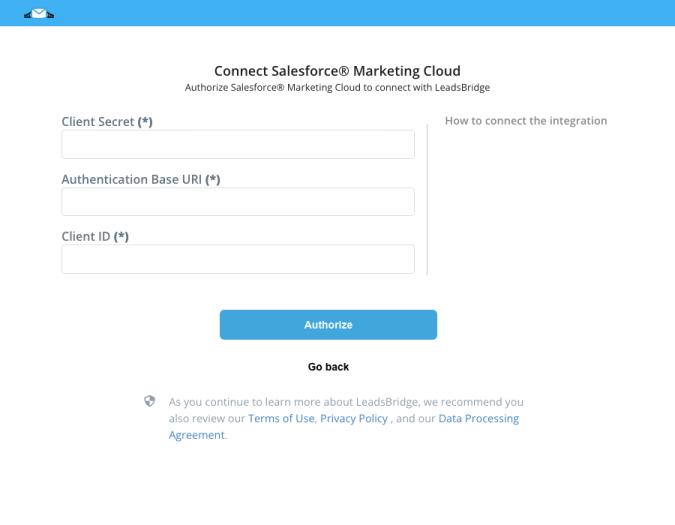

Step 2.B: Configuration details for Salesforce® Marketing Cloud
How to get Client ID, Client Secret, Authentication Base URI
- Log into Exact Target with an Admin User
- On the top right of the screen, next to your username, make sure to select the correct Company, or Business Unit, that you want to connect with LeadsBridge
![]()

- Click on your username on the top right of the screen
- Click on Setup
- Go to Apps » Installed Packages, under Platform Tools
- Click on New at the top right of the screen
![]()

- Give a name to your New Package, for example LeadsBridge
- Click on Save
![]()

- Click on Add Component
![]()

- Select API Integration, then click on Next
![]()

- Select Server-to-Server, then click on Next
![]()

- Click on the Edit button of the API Integration you just created
![]()

- Flag the following items:
- Under Channels » Web, flag Read, Write and Publish
![]()

- Under Contacts » Audiences & Contacts » List and Subscribers, flag every item (if you want to use Lists)
![]()

- Under Data » Data Extensions & Data » File Locations, flag every item (if you want to use Data Extensions )
![]()

- Click on Save
- Copy the Authentication Base URI, Client ID and Client Secret from the API Integration you have just created on Exact Target
![]()

- Paste that information inside your LeadsBridge integration setup
Step 2.C: Setup your Email Notification integration
- Click on Connect Email Notification
- Click on Create new integration to connect your Email Notification (or select an existing one from the dropdown if you already connected it)
- A popup wil be opened where you can authorize the Email Notification integration
- Fill Sender Email, To Receivers, Subject, Text before lead data field to connect Email Notification with LeadsBridge
- Click on the Authorize button
- You can choose a name for this Email Notification and LeadsBridge integration (you can also edit it later)
- Once done, click on Continue button and you will get back to the bridge experience where you could choose additional integration settings
- Now that your Email Notification is connected, you can continue with the set-up of your bridge
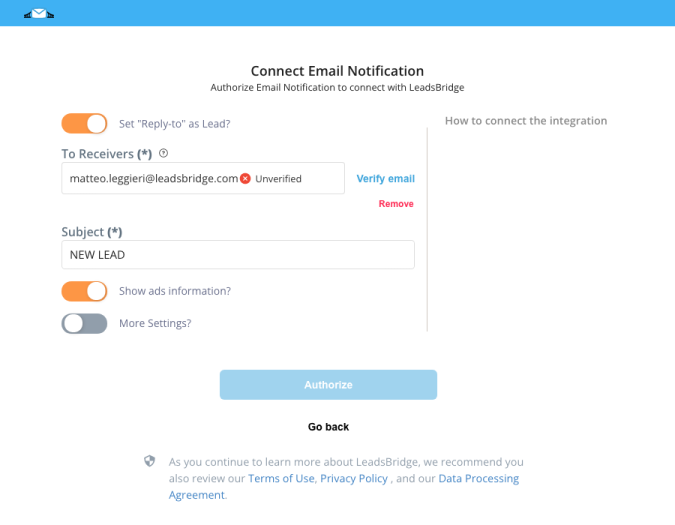

Step 2.D: Configuration details for Email Notification
Other Info
This is a preview of the Email Notification message that will reach your inbox once the bridge is set up.
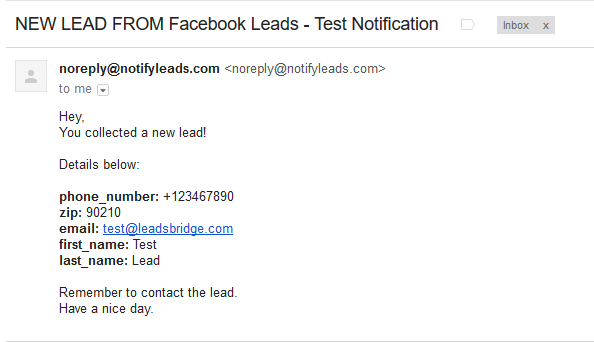

Step 2.E: Email Receipt (Optional)
You may choose to receive an email receipt for each incoming lead.
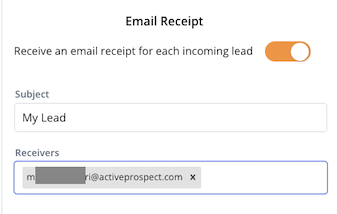

- Type the address(es) where you'd like to receive the receipt
- You may also modify the Subject line of the email
Step 3: Fields Mapping
Here you'll be able to map your Salesforce® Marketing Cloud information with your Email Notification fields.
- You will have Email Notification fields on the left. Match the information you wish to pass align from Salesforce® Marketing Cloud
- Based on Email Notification functionality, some fields might be required; if this is the case, you can identify those fields with a * (star), so be sure to map all them
- You can also use the functions to customize information like reformatting dates and times or modifying text, phone numbers and so on.
- You may leave blank the box of a field's information you don't want to send through. Clicking on the Show unmapped fields button you will have visibility on all the available fields still not mapped
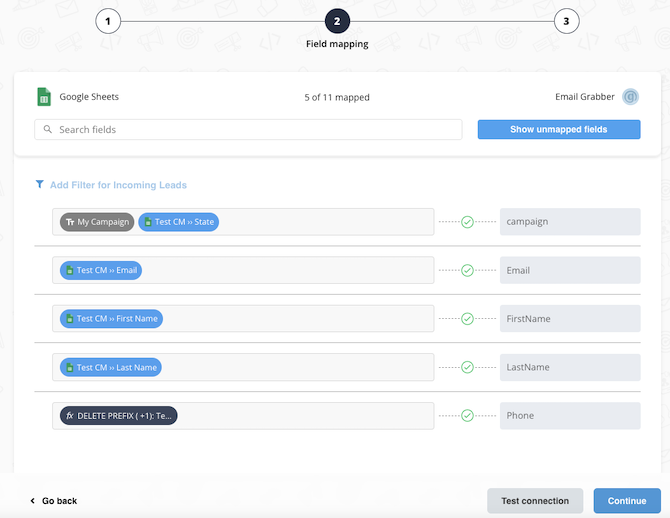

Step 3.A: Leads Filter (Optional)
If you'd like you could add a filter for incoming leads. This filter will sync only leads that meet the configured conditions
- Click on the link Add Filter for Incoming Leads on the top left
- A popup wil be opened where you can configure the filter
- You can define a series of condition to filter the leads. The lead will be synced only when all the conditions will be met
- Once finished, click the Save Changes button to switch back to the Fields Mapping to continue with the bridge configuration
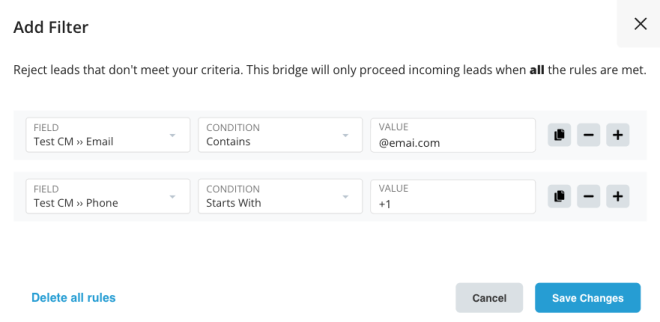

Step 4: Save and Publish
- Click on the Save and publish button
Congratulations! Now your bridge is up and running
Do you need help?
Here some additional resources:
- Salesforce® Marketing Cloud documentation page and common questions
- Email Notification documentation page and common questions
- LeadsBridge KNOWLEDGE BASE
- Contact support from your account clicking on the top right Support button






